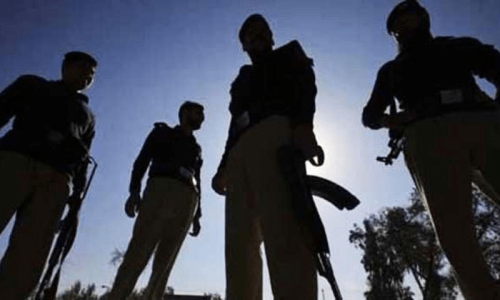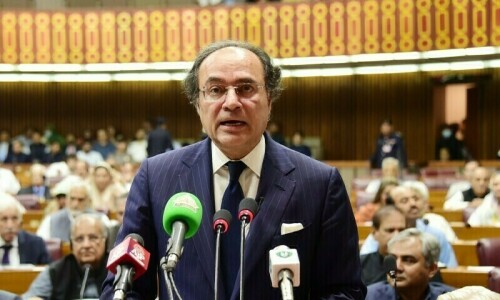WASHINGTON, Oct 24: The technology the Khan network provided to North Korea was meant for developing civilian nuclear energy and not weapons, says a senior Pakistani military official.
The official said, in a background briefing on the country’s nuclear strategy at the Pakistan Embassy, that the information had been obtained from Dr A.Q. Khan who has been in the government’s custody since his February 2004 confession that he was running a secret network of nuclear proliferators.
“Dr Khan says that the North Korean programme was for developing fuel for civilian purposes,” said the official.
US intelligence reports also confirm the Pakistani claim, saying that the test North Korean conducted on Oct 9 was plutonium based while Pakistan uses uranium for producing nuclear fuel.
The Pakistani official, who has extensive familiarity with the country’s nuclear infrastructure, focussed on three key points during his presentation: the ugly proliferation chapter of the distant past will never be repeated, there’s no possibility of religious elements taking over Pakistan’s nuclear assets and the country’s nuclear weapons are no threat to the world.
As one of the mainstream US newspapers later pointed out, the session reflected Pakistan’s concerns that the activities of the Khan network were in the spotlight again after the North Korean nuclear test.
The official, who could not be quoted by name under the ground rules of the briefing, conceded that the network run by Mr Khan, still a revered figure in Pakistan for his role in developing the country’s nuclear arsenal, ‘cast a long shadow’ over Pakistan’s image. “We have years of baggage to shed.”
The official urged Pakistan’s “friends and allies” not to doubt the country’s determination to pursue a foolproof nuclear policy. He used a power-point presentation to outline institutional and policy safeguards on nuclear technology that Pakistan has imposed since its 1998 nuclear tests and since the unravelling of the Khan network.
“We have a good system now down to the grass roots,” he explained.
The official warned that the proposed Indo-US nuclear pact was a “one-sided deal” that could prove “counter-productive for US strategic objectives” in South Asia if Islamabad was not offered a similar arrangement.
He advised US policy-makers to make their nuclear policy “criteria-specific and not country-specific” as the proposed Indo-US deal was. “It should provide a level playing field for Pakistan as well,” said the official, adding that Islamabad had ambitious nuclear power plans to fuel economic growth.
Pakistan, he said, has to expand its energy production from 19,500MW to 163,000MW, an 800 per cent increase, if it wants to maintain the current pace of economic development. Pakistan also plans to increase the production of nuclear energy from 400MW to 8,800MW. “That’s why we need a criteria-based approach from the US.”
The official said he saw little hope of derailing the US nuclear deal with India. The accord would allow India to keep its nuclear military programmes free from international monitoring. Pakistan and many US critics fear the deal could allow India to bulk up its nuclear arsenal and overwhelm Pakistan’s smaller deterrent.
“This will disturb the minimum deterrence level maintained in South Asia since the 1998 nuclear tests,” the official pointed out. “Pakistan will have to respond to the piling of the fissile material in India and will have to have a more dynamic response to this development.”
Asked to explain the country’s minimum deterrence level, he said that in case of a nuclear attack, the country should have enough weapons to hit back.
The official acknowledged that non-proliferation experts in the West continued to worry about Pakistan’s capability to prevent future proliferation while some also feared that if the Musharraf government collapsed, religious extremists might become the custodians of the country’s nuclear weapons.
“The A.Q. Khan saga is a thing of the past,” he said. “What has been done cannot be undone but it is time to move on and put the sordid business behind, solely and imaginatively.”
He said the region that now comprises Pakistan does not have a history of violent takeovers and the Pakistan army is a professional force built on British professional standards. “There is no possibility of an extremist takeover.”
He explained that nearly a decade ago, the country began a thorough revamping of its nuclear bureaucracy, increasing the levels of oversight, implementing new controls on the production and transfer of nuclear materials and establishing “reliability tests” for Pakistani nuclear researchers.
He confirmed that US nuclear specialists had been providing technical advice and some “off-the-shelf” basic equipment to aid Pakistan’s non-proliferation efforts, but stressed that Pakistan had total say over what help it accepts.
“Some say that Pakistan has surrendered its nuclear sites to the Americans. Others say that Pakistan is not doing anything to prevent proliferation. Both are wrong. The reality is somewhere in between.”
The official said that Pakistan also protected its national interests during the probe into the Khan network of proliferators. “We made it clear that it is the network that is under investigation and not Pakistan’s nuclear programme.”
He added that for “reasons of national sensitivity,” the father of Pakistan’s nuclear programme could not be made available for direct questioning but can continue to be questioned through Pakistani intelligence agencies.
“We receive questions (from foreign governments) and send the answers back to them,” he said.
“Whatever Mr Khan says, we don’t add anything and we don’t subtract anything” when relaying his replies to the questioners, the official said, adding that Dr Khan sometimes refused to talk.
“Even if we were to allow foreign agencies to interrogate him, it will serve no purpose. He can simply refuse to talk, as he sometimes does with us. How can you make him talk? He is a national hero, he cannot be tortured.”















































Dear visitor, the comments section is undergoing an overhaul and will return soon.